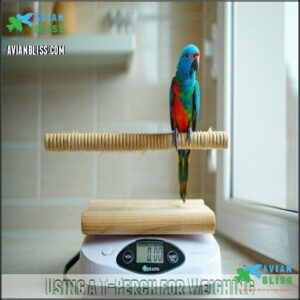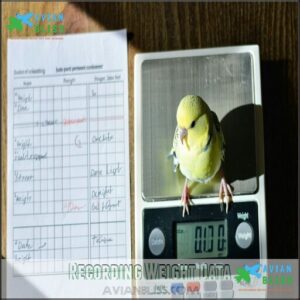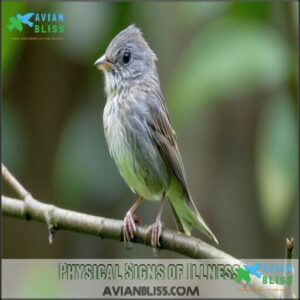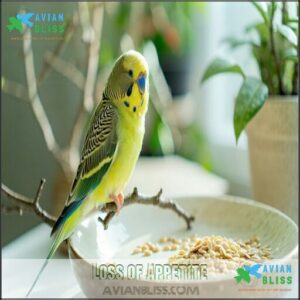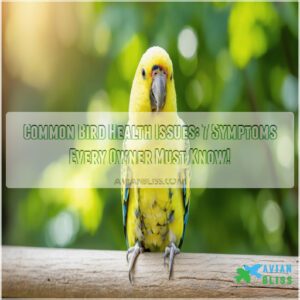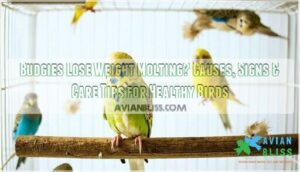This site is supported by our readers. We may earn a commission, at no cost to you, if you purchase through links.
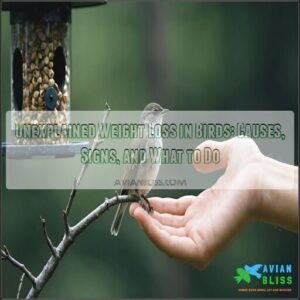
Birds naturally hide illness until they’re seriously sick, making weight loss an important early warning sign. Your feathered friend might be suffering from infection, parasites, nutritional deficiencies, or organ disease.
Check for other symptoms like fluffed feathers, decreased activity, or changes in droppings. Weighing your bird regularly with a gram scale can help you catch problems before they become critical—visual checks often miss weight changes until they’re severe.
Regular weigh-ins establish what’s normal for your specific bird, creating a baseline that could literally save their life.
Table Of Contents
- Key Takeaways
- Why Weigh Birds Regularly
- Causes of Unexplained Weight Loss
- Weighing Techniques for Birds
- Identifying Signs of Illness
- Addressing Unexplained Weight Loss
- Frequently Asked Questions (FAQs)
- Why is my bird losing so much weight?
- What are the symptoms of iodine deficiency in birds?
- What kind of weight loss is alarming?
- Can you tell if a bird is losing weight?
- What are the chief causes of unexplained weight loss?
- What happens if a bird is overweight?
- Do dead birds lose weight?
- How can I Help my obese bird lose weight?
- Do hummingbirds lose weight?
- Can environmental changes cause sudden weight loss?
- Conclusion
Key Takeaways
- Your bird’s unexplained weight loss is an important early warning sign that shouldn’t be ignored, as birds naturally hide illness until they’re seriously sick.
- You’ll need a reliable gram scale for regular weighing—visual checks often miss weight changes until they’re severe, and even a 5% drop could signal serious health issues.
- Watch for accompanying symptoms like fluffed feathers, decreased activity, changes in droppings, or behavioral shifts which can help identify the underlying cause.
- Don’t wait to seek veterinary care if you notice weight loss, as prompt intervention is critical—common causes include infections, parasites, nutritional deficiencies, and organ diseases.
Why Weigh Birds Regularly
Weighing your bird regularly helps you catch early signs of illness, as even minor weight changes can indicate health problems.
Regular bird weighing is your early warning system—detect health issues before they become emergencies.
Regular weight tracking also allows you to establish a baseline, making it easier to spot any concerning trends over time, which is crucial for maintaining your bird’s health and catching early signs of illness.
Early Detection of Illness
Catching early signs of illness in birds can be lifesaving, as they’re experts at hiding being sick.
Subtle symptoms like behavioral shifts, plumage changes, and appetite decline often show after unexplained weight loss appears.
Regular weighing reveals critical clues:
- Just a 5% weight drop could signal serious issues.
- Masking symptoms is an instinctive bird behavior for survival.
- Rapid weight loss often points to underlying bird illness indicators, urging immediate action.
Changes in their feathers, like ruffled or messy plumage, can also be indicative of health problems.
Monitoring Weight Changes
Keeping an eye on your bird’s weight is essential for catching problems early.
Subtle weight changes are often overlooked but can signal serious issues like illness or stress.
Regular bird weight monitoring with a well-calibrated bird weight scale guarantees accuracy, so pick one with precise readings.
Remember, scale calibration tips, like maintaining a stable surface, can prevent errors.
Tracking weight daily establishes baseline weight factors, helping you spot shifts caused by hydration weight impact or environmental weight influence.
Check fluctuations alongside behavior changes, like reduced activity, for a clearer picture.
Use a journal or app for consistent bird weight tracking; it’s a simple routine but a lifesaver.
Even 5% weight loss might need a vet’s attention, so act early to address potential issues related to bird weight monitoring.
Maintaining Health Records
Tracking your bird’s weight changes creates a detailed picture of its health, helping you spot subtle patterns others might miss.
Weight tracking is your bird’s silent storyteller, revealing health secrets before symptoms speak.
Regular data logging with digital tools simplifies bird health monitoring, letting you easily manage bird health records.
Clear weight tracking supports veterinary sharing, enhancing diagnosis precision for issues like bird weight loss.
Over time, trend analysis reveals insights, making record keeping a reliable safeguard for your feathered friend’s well-being.
Causes of Unexplained Weight Loss
When your bird starts losing weight without explanation, it’s often a sign that something deeper is affecting their health.
Common causes include infections, parasites, nutritional deficiencies, or underlying diseases, all of which require careful observation and prompt attention.
Viral Diseases
Viral diseases, like Circovirus Impact or Avian Poxvirus, often cause rapid bird weight loss, leaving owners confused.
Look for these bird symptoms:
- **Nasal discharge, labored breathing, or drooping energy.
These signs hint at serious avian diseases like beak and feather disease or Polyomavirus Symptoms.
Viral Transmission spreads through direct contact or contaminated surfaces, so hygiene is essential.
Consult an avian vet for treatment options, including vaccines. Prompt action can prevent bird illness and halt worsening complications.
Fungal Infections
Fungal infections, including aspergillosis, are linked to avian weight loss and respiratory symptoms like sneezing and nasal discharge.
Aspergillus exposure thrives in damp, unclean environments, leading to systemic mycosis if untreated.
Diagnosing fungi requires identifying symptoms or lab testing.
Antifungal drugs are key for recovery.
Good husbandry practices are critical for prevention.
Strong environmental control—clean cages, good ventilation—can prevent fungi, especially if a bird’s ill or unexpectedly losing weight.
Cleanliness matters!
Bacterial Infections
Bacterial infections in birds often arise from contaminated water, food, or perches, making hygiene essential.
Infection sources cause sick bird symptoms like weight loss, vomiting, or lethargy.
A bird losing weight quickly signals trouble, requiring a bird vet visit for antibiotic treatment.
Probiotic use may aid recovery, but prevention strategies like proper sanitation are your best defense.
Parasites and Worms
Parasites, both internal and external, often cause bird health issues like sudden weight loss. These tiny invaders sap nutrients, leaving your bird malnourished despite normal eating.
Look out for sick bird symptoms like abnormal droppings or lethargy. Regular weight checks can help you spot changes early.
Use these preventative measures to protect birds:
- Schedule routine avian vet visits.
- Perform fecal exams.
- Follow deworming birds schedules.
- Maintain clean living areas.
- Monitor droppings closely.
Weighing Techniques for Birds
Accurate weighing techniques are essential for tracking your bird’s health and spotting early signs of illness.
Use a reliable scale and weigh your bird consistently at the same time each day to establish a precise baseline.
Choosing The Right Scale
Accurate weight monitoring starts with the right scale. Look for scale accuracy with 1-gram increments, guaranteeing precise readings for weight changes.
A scale’s features—like a digital vs. analog model or a tare function—simplify weight tracking. Prioritize a stable perch or container for comfort. Guarantee you’re using a scale with reliable bird scale accuracy for the best results.
| Feature | Why it Matters |
|---|---|
| Scale accuracy | Tracks small weight changes |
| Gram increments | Ensures precise results |
| Tare function | Simplifies container use |
| Perch stability | Reduces stress while weighing |
Even a reliable kitchen scale can maintain consistent weight records.
Using a T-Perch for Weighing
Using a T-Perch simplifies weight monitoring and guarantees consistent placement for accurate results.
Choose a perch material that’s sturdy, safe, and sized for your bird’s feet. Training the bird to step onto the perch calmly builds trust and makes the process stress-free.
Keep the T-Perch clean to prevent infections. For alternative perches, opt for options compatible with a kitchen scale.
Reliable weighing helps you track weight changes and maintain detailed weight records. Many owners buy a dedicated bird T-perch to help with this.
Recording Weight Data
Tracking your bird’s weight isn’t just smart—it’s essential for spotting issues early.
Use a reliable scale with proper calibration and follow these steps:
- Weigh your bird daily at the same time to guarantee weight consistency.
- Record measurements in a bird weight chart or digital records for precise data logging.
- Graph trends to monitor weight fluctuations over time.
- Note any feather condition changes, tying data to potential bird weight loss concerns.
Consistency protects your bird’s health!
Establishing a Baseline Weight
Establishing a baseline weight starts with an Initial Weight measurement and continues with daily bird health weight tracking.
Weigh your bird at Consistent Timing, calibrating the scale for precision.
Use a bird weight chart to monitor trends and account for Breed Variation and seasonal changes.
Sudden bird weight loss or patterns outside normal Baseline Adjustments highlight potential bird weight loss causes, ensuring better bird weight management.
Identifying Signs of Illness
Spotting signs of illness in birds means paying close attention to subtle changes in their behavior, appearance, and droppings.
By observing these early indicators, you can quickly identify potential health concerns and take action before they escalate, which is crucial for the well-being of the birds, emphasizing the importance of early indicators.
Behavioral Changes
Behavioral changes can hint at bird illness, especially alongside gradual weight loss.
Your bird might be trying to "tell" you something, so watch for these signs:
- Aggression Increase: A friendly bird suddenly acting cranky may feel unwell.
- Decreased Talking and Play Decline: Reduced vocal energy or playing less can signal illness.
- Sleep Changes: Napping excessively or becoming lethargic isn’t normal.
Always observe bird attitude changes or unusual energy levels—they’re key signs of illness.
Physical Signs of Illness
Spotting physical signs of illness in birds can help catch issues early. Poor feather condition, like unusual shedding or dull appearance, often signals bird illness.
Eye appearance is another clue—cloudy or sunken eyes aren’t normal. Beak abnormalities, such as cracks or flakiness, shouldn’t be ignored.
Watch breathing patterns too; open-mouth breathing or heavy chest movements are red flags. Subtle signs like lethargy or weight loss may hint at bird diseases.
Don’t dismiss these cues—they’re often key indicators of underlying problems, and spotting them can help with early detection of bird diseases.
Changes in Droppings
Bird droppings can reveal a lot about your bird’s health. Keep an eye on consistency, color, and volume changes to spot potential problems.
Normal droppings should have brown feces, white urates, and clear urine. Abnormal colors, undigested food, or watery consistency might indicate bird disease or illness.
One concern is the transmission of over 60 diseases through contact with bird waste.
- Watch for sudden shifts in dropping consistency or appearance.
- Check droppings daily for bird droppings analysis.
- Use changes to aid in diagnosing bird illness early.
Loss of Appetite
Skipping meals or eating less could point to food aversion, crop impaction, dental issues, or even bird anorexia.
Dietary deficiencies, metabolic disorders, or stress may lead to malnutrition in birds.
Track their diet carefully and note any sudden changes.
If appetite loss continues, diagnosing bird illness with prompt bird veterinary assistance is critical to restoring health and managing their diet effectively.
Addressing Unexplained Weight Loss
To address your bird’s unexplained weight loss, start by reviewing its diet, ensuring it meets nutritional needs and matches species-specific requirements.
If changes persist or worsen, consult an avian veterinarian to rule out underlying health issues and receive proper guidance.
Reviewing Food Intake
When dealing with bird weight loss, tackle feeding problems first. Is the feeding schedule steady? Look at diet composition—are nutrients balanced or is food quality poor?
Monitor their bird food intake daily. Here’s a simple checklist:
- Prioritize fresh, nutrient-packed food options.
- Adjust portion control to prevent underfeeding or overfeeding.
- Limit treats impact by sticking to essential avian nutrition.
- Always review bird diet evaluation results to fix possible malnutrition sources.
Tracking these boosts your bird’s wellness and helps address bird weight loss.
Ensuring The Right Diet
A balanced diet is the backbone of avian nutrition, preventing bird malnutrition and feeding problems.
Focus on nutrient-rich foods like fresh produce, high-quality pellets, and seed alternatives. Avoid processed options with unhealthy additives.
Gradual shifts to a nutrient-rich diet help your bird adjust without stress. For ideal nutrition, consider supplementing their diet with high-quality bird pellets.
Keep an eye on supplementation needs, especially for vitamins and minerals. A thoughtful bird diet, filled with variety, supports overall health and tackles unexplained weight loss effectively, keeping your feathered friend thriving.
Watching for Behavioral Changes
Stay alert to bird behavioral changes—it could save their life.
Subtle signs of sickness often appear as shifts in daily habits.
- Aggression Increase: A sudden feistiness may point to underlying issues.
- Vocalization Changes: Quiet birds becoming chatty, or chatty birds going silent? That’s a clue.
- Activity Levels: Lethargy or hyperactivity signals trouble.
- Sleep Disturbances and Social Interaction: New patterns or withdrawal hint at stress or illness.
Seeking Veterinary Care
If your bird shows emergency signs—like over 10% weight loss or rapid breathing—call an avian veterinarian immediately.
Share weight trends and bird health concerns in detail for the best vet communication. Diagnostic tests pinpoint causes and outline treatment options.
Remember to find an avian veterinarian for specialized bird care.
Follow your vet’s recommendations closely, as diagnosing bird illness early guarantees quicker recovery. Avian veterinary care saves lives when illness signs appear, and it is crucial for quicker recovery.
Frequently Asked Questions (FAQs)
Why is my bird losing so much weight?
Like a canary in a coal mine, your bird’s weight loss may signal health problems.
Common causes include malnutrition, illness, stress, or parasites.
Contact an avian vet immediately as birds hide illness until critically sick.
What are the symptoms of iodine deficiency in birds?
You’ll notice a goiter (neck swelling), noisy breathing, and regurgitation in your bird with iodine deficiency. They might also show lethargy, voice changes, and difficulty swallowing their food.
What kind of weight loss is alarming?
When your feathered friend loses 10% of their body weight suddenly, it’s time to worry. You’ll need to contact your vet immediately if they drop 5% or show gradual decline over weeks.
Can you tell if a bird is losing weight?
You can detect weight loss in your bird by regular weighing.
Observing prominent breastbone, checking if feathers look loose-fitting, noticing decreased muscle mass, or watching for changes in behavior and energy levels.
What are the chief causes of unexplained weight loss?
Over 70% of pet bird weight loss cases stem from underlying illness.
Your bird’s unexplained weight loss could be caused by malnutrition, respiratory infections, parasites, stress, or digestive disorders requiring immediate veterinary attention.
This situation necessitates immediate veterinary attention to address potential health issues.
What happens if a bird is overweight?
Your overweight bird risks heart disease, arthritis, and breathing problems.
You’ll notice slower movement and decreased stamina during play.
Trim your bird’s waistline by adjusting portions and increasing exercise opportunities through interactive toys to improve your bird’s stamina.
Do dead birds lose weight?
Time waits for no bird, indeed.
You’ll notice weight reduction continues until only skeletal remains are left.
Yes, dead birds do lose weight as decomposition processes release gases and fluids from the body, this is a complete process.
How can I Help my obese bird lose weight?
Gradually switch your bird to a balanced pellet diet, reduce seed portions, and increase exercise opportunities.
Offer fresh vegetables and fruits as healthy treats.
Consult an avian vet for a customized weight-loss plan.
Do hummingbirds lose weight?
Amazingly, hummingbirds can lose up to 40% of their body weight during migration.
You’ll notice they’ll bulk up before long journeys, then shed weight as they travel.
They’re nature’s ultimate weight managers, constantly balancing energy needs with available nectar.
Can environmental changes cause sudden weight loss?
Yes, environmental changes can trigger sudden weight loss in your bird. Stress from new surroundings, temperature fluctuations, or disrupted routines can affect appetite and metabolism, leading to quick weight decline.
Conclusion
Like a detective searching for clues, monitoring your bird’s weight is essential for their health.
Don’t ignore unexplained weight loss in your bird—it’s often the first sign of serious health issues.
By weighing your feathered friend weekly, tracking their diet, and knowing their normal baseline, you’ll catch problems early.
Remember, birds instinctively hide illness until they’re critically sick, so trust your observations and don’t hesitate to consult an avian vet when weight changes occur, as this can be a matter of critical health.




